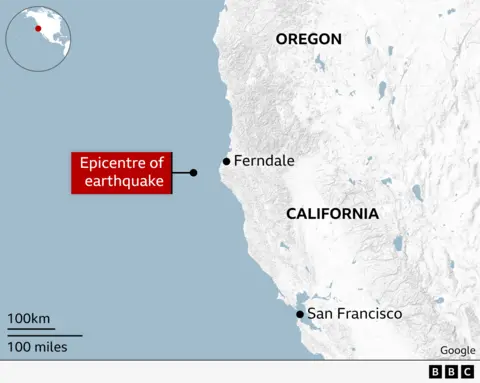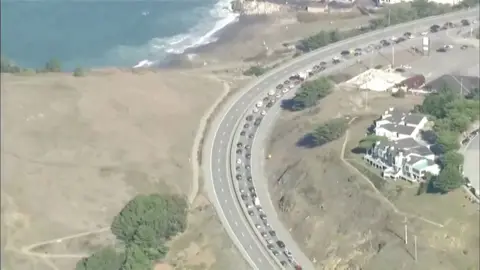A strong 7.0 magnitude earthquake has struck off the coast of northern California, according to the US Geological Survey.
A tsunami warning was initially issued along the coasts of both northern California and southern Oregon – an area that includes about 4.7 million people – but was later rescinded.
The earthquake’s epicentre hit closest to the town of Ferndale, California, a small city in Humboldt County about 260 miles (418km) north of San Francisco.
Local officials said no deaths or major widespread damage had been reported in the aftermath.
Humboldt County Sheriff’s Office told CBS News, the BBC’s US partner, there had been no catastrophic destruction to buildings or infrastructure, but some homes did report minor damage.
Several stores in the area reported items falling off shelves and power briefly went out for many residents, the sheriff’s office said.
More than 10,000 people were without power in Humboldt County after the earthquake struck, according to poweroutage.us.
While the earthquake did not cause widespread damage, one resident of Ferndale who spoke to the BBC in the minutes following the quake said the inside of the building she was in “looks like a bomb has gone off in every room”.
Olivia Cobian, the innkeeper at the Gingerbread Mansion Inn in Ferndale, said the inside of the inn now “looks like a warzone”.
“We have huge cast iron fireplaces that have been lifted up and moved over, everything’s fallen over, broken”.
Another who witnessed the quake was Todd Dunaway, who was eating lunch in his home in Fortuna, California when the earthquake hit.
“It literally felt like standing on a giant waterbed,” he told the BBC. “The noise of rattling windows, creaking walls, falling dishes and decorations added to the drama and scariness of it all as it is happening. Naturally – you can’t help wonder as it is happening ‘Is this the really big one?'”
 Todd Dunaway
Todd DunawayMr Dunaway said he and his wife – who was also in the house – were shaking nervously for 15 minutes afterwards waiting to see if there would be a bigger aftershock.
His large swimming pool was still sloshing ferociously for minutes after the shaking stopped and lost about 18 inches (45cm) of water.
His sporting goods store experienced some damage, with boxes of shoes falling from the shelves, but nothing major, he said.
Multiple aftershocks were reported after the initial earthquake, which struck around 10:44 local time (18:44 GMT).
Some areas, including the city of Berkeley in northern California, issued an evacuation order due to the threat of a possible tsunami.
“EVACUATE NOW,” an X post from the city warned. “People in the Tsunami Zone are in IMMEDIATE DANGER and MUST EVACUATE NOW. Stay east of 7th St. This is a lawful order to leave now.”

Kayla Aihara was staying at a hotel in Half Moon Bay, California and got the back-to-back alerts about the earthquake and potential tsunami.
Before the tsunami warning was cancelled, workers at the hotel had told her to vacate a gym and go to higher ground out of fear of the tsunami’s impacts.
Some vacated outside and she said multiple people crowded near the shoreline of the Pacific Coast hotel, watching the waves and waiting to see any hints of a tsunami.
California Governor Gavin Newsom was briefed on the earthquake and met with state emergency officials to help coordinate the response.
At an event along the US-Mexico border, the governor announced he’d signed a state of emergency declaration to help free resources to respond to the earthquake.
He said the earthquake is “another reminder of the state that we live in and the state of mind that we need to bring to our day-to-day reality here in the state of California”.
 Reuters
ReutersTsunami signs line the roads of many coastal communities along the US West Coast. They mark any “tsunami hazard zone” and often point those in the area to evacuation routes leading them to higher ground.
Those who live in these tsunami zones are encouraged to familiarise themselves with their evacuation routes and have a kit ready for quick evacuation.
California’s emergency services website notes a tsunami can hit in as little as 5 to 10 minutes after a large earthquake and sometimes the first wave to hit is not the biggest. It notes if you see water draw out from the shoreline and go out to sea quickly, “escape immediately to higher ground or inland”.
The US West Coast is the confluence of a number of the Earth’s tectonic plates, and tremors are not uncommon. But a strong 7 magnitude quake isn’t typically seen in the region. Experts say there are between 10 and 15 earthquakes of this magnitude that hit globally each year.
The area has been struck by a number of major earthquakes, including a 1994 quake that hit Northridge, in the Los Angeles area, killing dozens of people and injuring thousands more, as it wrought billions of dollars of damage to homes and infrastructure.
Additional reporting by Alys Davies and Samanatha Granville



